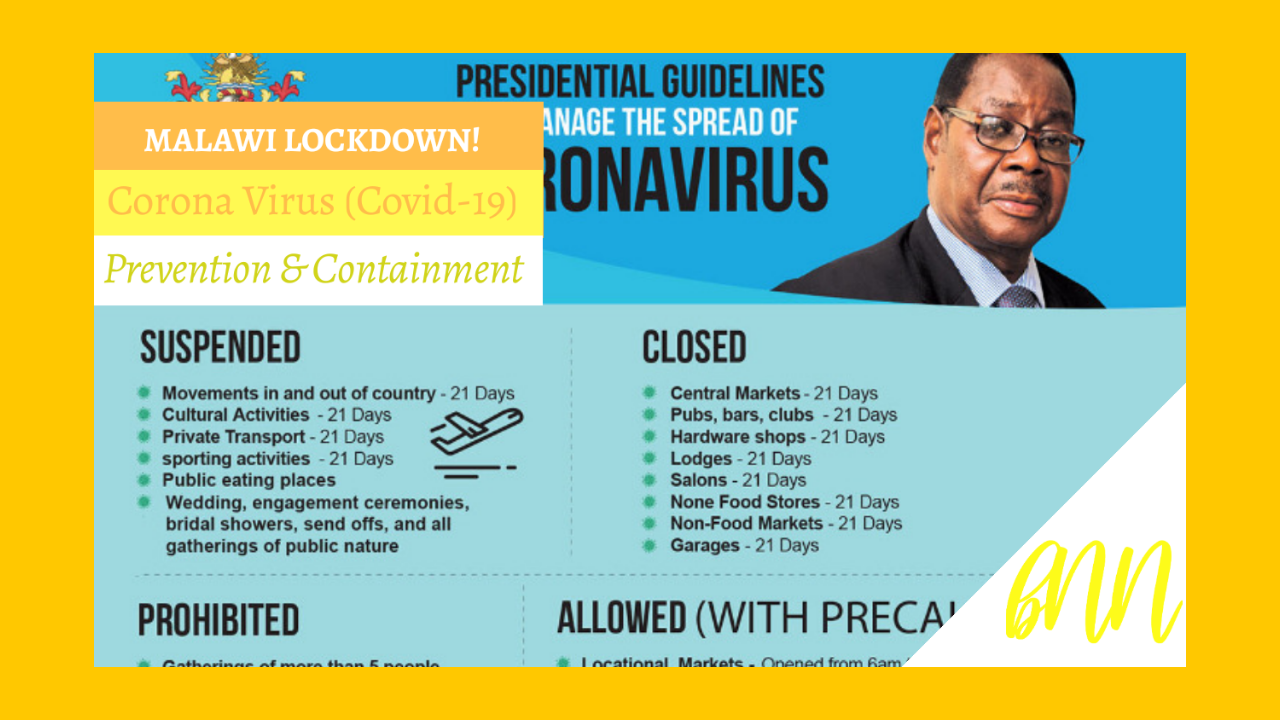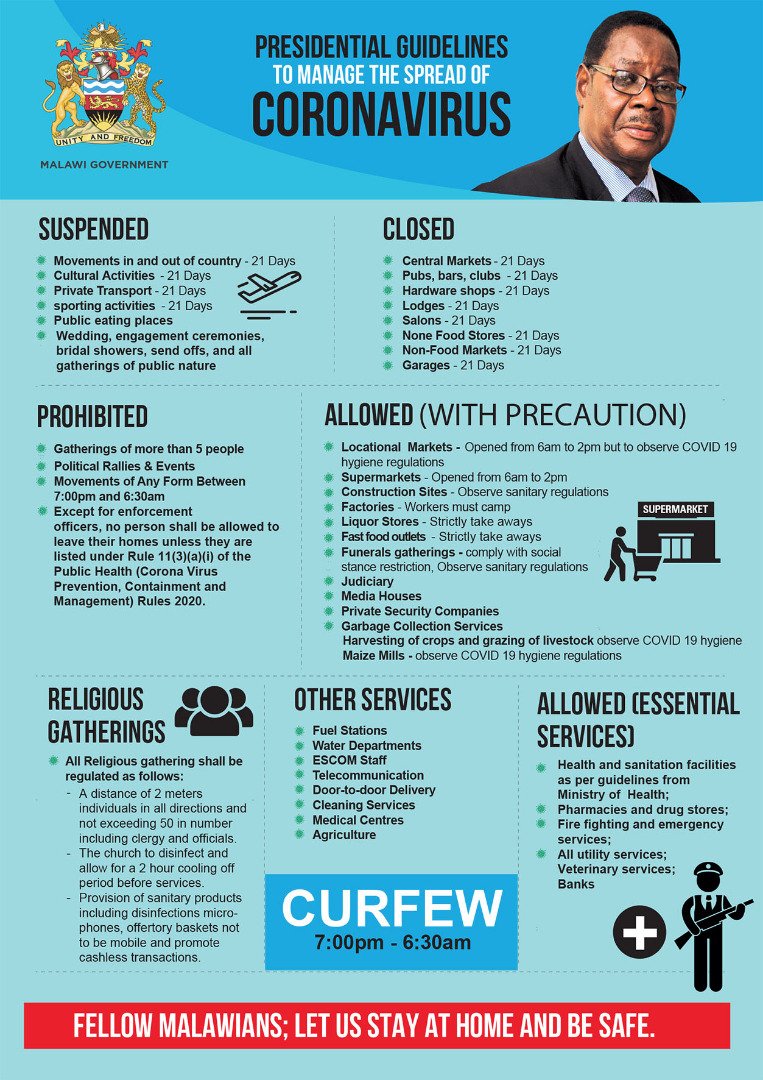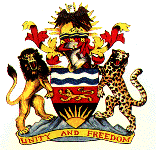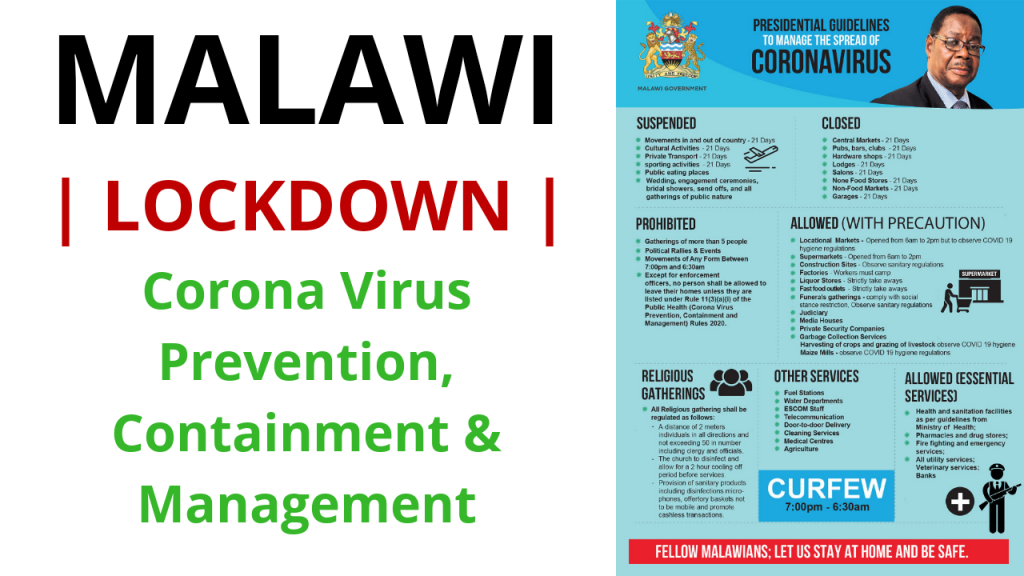


Author: Chizaso Eric Nyirongo
Ref. No. Sub. D. 34:01
Ministry of Justice and Constitutional Affairs
Draft: Public Health (COVID-19 Prevention, Containment and Management) Rules, 2020
8th April, 2020


PUBLIC HEALTH ACT
(Cap. 34:01)
PUBLIC HEALTH (CORONA VIRUS PREVENTION, CONTAINMENT AND MANAGEMENT) RULES, 2020
IN EXERCISE of the powers conferred by section 31 of the Public Health Act and pursuant to my declaration of the corona virus disease as a formidable disease on the 1st day of April, 2020, I, JAPPIE CHANCY MTUWA MHANGO, Minister of Health, make the following Rules—
ARRANGEMENT OF RULES
RULE
SCHEDULE
(Cap. 34:01)
PUBLIC HEALTH (CORONA VIRUS PREVENTION, CONTAINMENT AND MANAGEMENT) RULES, 2020
1. These Rules may be cited as the Public Health (Corona Virus Prevention, Containment and Management) Rules, 2020.
2. In these Rules, unless the context otherwise requires___
“area civil protection officer” means an area civil protection officer referred to in section referred to in section 23 of the Disaster Preparedness and Relief Act;
“corona virus” means the severe acute respiratory syndrome corona virus 2 (SARS-CoV-2) which emerged during 2019;
“COVID-19” means the official designation of the severe acute respiratory syndrome which was declared a global pandemic by the World Health Organization on the 11th March, 2020;
“essential services” means services listed as essential services in the Schedule hereto;
“head of the institution” means the controlling officer of a public institution or the chief executive officer or the equivalent position of a private institution;
“enforcement officer” means—
“gathering” means an assembly, concourse or procession of more than ten persons, whether wholly or partially in open air or in a building;
“isolation” means separating an individual infected with COVID-19 from healthy individuals in such a manner as to prevent the spread of infection or contamination by COVID-19;
“lockdown” means the restriction of movement of persons declared under Rule 11; and
“quarantine” means separating asymptomatic individuals potentially exposed to COVID-19 from non-exposed individuals in such a manner as to prevent the possible spread of infection or contamination by COVID-19.
3.—(1) The object of these Rules is to enable the Minister to implement measures to prevent, contain and manage the incidence of COVID-19.
(2) These Rules are enforceable whether or not a state of disaster in relation to COVID-19 is in force under the Disaster Preparedness and Relief Act.
4. These Rules apply to the whole of Malaŵi except where otherwise provided.
5.—(1) The Minister may, pursuant to the declaration of COVID-19 as a formidable disease under section 30 of the Act prescribe measures to be imposed in order to prevent, contain and manage COVID-19 infection.
(2) In pursuance of the object of these Rules and in addition to the powers granted to the Minister under section 31 of the Act, the Minister may, in consultation with any line Minister, and in conformity with any directions the line Minister may give, impose additional measures in order to prevent, contain and manage COVID-19.
(3) Where the Minister prescribes such measures or additional measures, he shall, soon thereafter, cause the measures to be published in the Gazette.
6.—(1) An enforcement officer may, in relation to an individual or group of individuals who are suspected of being infected with, or who may have recently been exposed to the risk of infection by corona virus, order any one or a combination of the following things—
(2) An enforcement officer may order any individual or group of individuals who have been confirmed, clinically or by a laboratory, as having COVID-19 to be quarantined for a period of not less than fourteen days within their homes or in a hospital or place of isolation and, during the period the quarantine is in force, to—
(3) Orders made under sub-rule (1) or (2)—
(4) A person who—
commits an offence and is liable to fine of twenty thousand Kwacha and imprisonment for three months.
(5) A person who escapes or attempts to escape from any place of detention, isolation or quarantine may be arrested without warrant.
7.—(1) The Minister may identify or approve sites to be used as isolation and quarantine facilities for the temporary confinement and management of individuals or groups of individuals who are suspected of being infected with, or who may have recently been exposed to the risk of infection by, or who have been confirmed as having COVID-19.
(2) The Minister shall as soon as practicable publish the sites identified or approved under sub-rule (1), by notice published in the Gazette.
(3) Any person who disobeys or fails to comply with an order under subsection (1) commits an offence and is liable to fine of twenty thousand Kwacha and to imprisonment for one year.
8.—(1) The chief executive officer or district commissioner of every local authority, as the case may be, shall furnish each enforcement officer who is acting within the jurisdiction of the local authority with a certificate signed by or on behalf of the chief executive officer stating that he has been appointed as an enforcement officer for the purposes of these Rules.
(2) An enforcement officer shall, on demand by any person affected by the exercise of the powers conferred upon enforcement officers under these Rules, exhibit the certificate issued to him under sub-rule (1).
9. At the request of the Minister, an area civil protection officer referred to under the Disaster Preparedness and Relief Act may designate other area civil protection officers who, in any local authority and acting under the guidance in that local authority of any enforcement officer, shall act as enforcement officers for the purposes of these Rules.
10.—(1) The services listed in the Schedule hereto shall be essential services.
(2) The head of the institution involved in the provision of an essential service or a person delegated by the head of the institution shall determine___
(3) After making a determination in terms of sub-rule (2), and at the request of the head of the institution, the Minister shall issue a permit to every person who shall perform the essential service.
(4) The permit referred to in sub-rule (3) shall___
(5) A person performing an essential service___
(6) The Minister may, at any time, amend the Schedule, by notice published in the Gazette.
11.—(1) In furtherance of the measures imposed under section 31 of the Act, the Minister may declare a lockdown:
Provided that where the declaration has been made prior to its publication in the Gazette, the Minister shall, as soon as possible after making it, cause it to published in the Gazette.
(2) The Minister shall, in the declaration,—
(3) During a lockdown___
(4) The Minister may, extend or further extend the duration of the lockdown for a period not exceeding one month at a time, and the Minister shall, as soon as possible after making the extension, cause it to be published in the Gazette.
12.—(1) For the purpose of these Rules, a “public gathering” is a gathering of more than ten persons, for a collective purpose, but does not include a situation where such number of persons coincidentally find themselves at a specific place at the same time:
Provided that where any number of persons coincidentally find themselves at a specific place at the same time, they shall observe a spacing between each other of at least two metres apart.
(2) An enforcement officer may, during the implementation of measures prescribed by the Minister under these Rules regarding restrictions on movement, order a public gathering to disperse and may use reasonable force to disperse a public gathering.
(3) In order to further regulate public gatherings, the Minister may—
(4) Any shop, market or kiosk selling or distributing essential products and basic necessities shall operate within prescribed COVID-19 guidelines, including—
(5) A person who contravenes this section or a measure imposed under this section, commits an offence and is on conviction liable to a fine not exceeding twenty thousand Kwacha and to imprisonment for three months.
13.—(1) The Minister may prescribe the following measures on employers and employees—
14.—(1) In furtherance of the provisions of section 38 of the Act, every person who___
shall for purposes of preventing the introduction of COVID-19 into Malaŵi, be refused entry into Malaŵi.
(2) Notwithstanding section 38 of the Act, a person who___
complies with or meets such requirements as may be determined by the Minister responsible for immigration in directives issued under these Rules or pursuant to the Immigration Act,
in the course of business or trade or commerce may be allowed to enter Malaŵi during the period of lockdown where entry is otherwise lawful.
15. The Minister may prescribe any of the following measures with respect to operation of public transportation and regulation of traffic in Malaŵi ___
(a) road transport___
(b) air transport___
(2) A person who contravenes sub-rule (1) commits an offence and is on conviction liable to a fine of twenty thousand Kwacha and imprisonment for three months.
16.—(1) Where an enforcement officer finds a person under circumstances which create a reasonable suspicion that the person is likely to contravene a restriction n movement, the enforcement officer may instruct the person to stop the journey in question and failure to obey the instruction shall be deemed to be a contravention of or failure to comply with the restriction, and that person is liable to a fine not exceeding twenty thousand Kwacha and to imprisonment for three months.
(2) Where a person has to travel to a restricted area or depart from a restricted area, for___
that person may obtain a permit from an enforcement officer nearest to that person or at the point of entry into or exit from a restricted area, authorizing travel.
(3) A person is exempt from the requirement of obtaining a permit to travel as contemplated in sub-rule (2), if that travel is necessary to___
17.—(1) The Minister may prescribe any of the following measures with respect to public entertainment and works in Malaŵi __
18.—(1) A judicial officer may use electronic means of hearing and conducting a matter as a primary means, including the service of documents, actual hearing of the parties, receiving evidence and making determinations.
(2) Where it is absolutely necessary that a matter be heard in chambers or in open court, a judicial officer presiding over a matter shall___
(3) The Chief Justice may___
suspend, extend or relax the procedure and time periods prescribed under the Supreme Court of Appeal Act, Courts Act and Local Courts Act;
(4) Directions issued under sub-rule (2)(a) shall be regarded, and have the same effect, as directives issued under rule 20.
19.—(1) Where it is absolutely necessary that a sitting of the National Assembly shall take place, the Speaker shall___
(2) The Speaker may issue directions to___
limit the number of persons who are not Members of Parliament to be present in the chamber, at any time;
(3) The Speaker shall, from time to time, request the Minister to prescribe special measures in the manner of administering proceedings in the National Assembly in order to combat the spread of COVID-19.
20.—(1) The Minister may issue directives for the purpose of___
(2) A directive issued under this rule has the force of law and may deal with any matter that is within the ambit of any legislation or other law that is administered by the Minister concerned.
(3) Any directive issued under this rule shall be___
(4) A directive issued in terms of these Rules becomes effective on the date of its publication in the Gazette.
(5) A directive may create offences for contraventions of, or failure to comply with, the directive and provide for penalties of a fine not exceeding twenty thousand Kwacha or imprisonment for a period not exceeding three months.
21.—(1) A person commits an offence if that person___
(2) A person convicted of an offence in terms of sub-rule (1) is liable to a fine of twenty thousand Kwacha and to imprisonment for three months.
SCHEDULE
(r. 2, 10)
1. Ambulance services
2. Casualties services
3. Theatre services
4. Intensive Care Unit (ICU) services
5. Hospital wards
6. Laboratory services
7. Pharmaceutical services
8. Dental services
9. Radiography services
10. Physiotherapy service
11. Mortuary services
12. Medical services including medical specialized services
13. Hospital kitchen services
14. Hospital laundry services
15. Emergency management services
16. Disaster management services
17. Portable water services
18. Waste water management services
19. Utility services
20. Electricity distribution services
21. Electricity operation services
22. Electricity maintenance services
23. Electricity transmission services
24. Electricity network operation services
25. Electricity system operation services
26. Electricity system security and planning services
27. Electricity engineering services
28. Electricity energy trading services
29. Air navigation services
30. Air traffic management services
31. Communication, navigation and surveillance system services
32. Search and rescue services
33. Aeronautical information services
34. Meteorological services for air navigation services
35. Firefighting and related emergency services
36. Veterinary services
37. Law enforcement
38. National defence
1. Agriculture, forestry and fishing
Agricultural production and value chains (Animal husbandry, Agronomic and horticulture) supply related operations, including farming, veterinary and phyto-sanitary provider services, pest control services, feed and chemical and fertilizer remedies providers.
Millers & logistics services.
2. Fishing
Vessel and fishing processing plants maintenance and service providers.
3. Mining and quarrying
Related operations to maintain minimal mining operations and essential maintenance work.
4. Manufacturing
Manufacturing of health related products, hygiene and sanitary related products, supplies, devices, equipment, and medicines, including complementary health products and supplements; food, non-alcoholic beverages and essential products, as well as essential inputs thereto. This includes production for exporting the same product categories. Production for disposable health and hygiene and sanitary related products, as well as for the production of packaging for essential health and food supply chains. Food, beverages and essential products manufacturing and processing facilities, to the extent they are supporting essential or essential business continuity services to the fight of COVID-19.
5. Electricity, gas, steam and air conditioning supply
Public and private organizations, their staff and service providers essential to the generation, transmission and distribution of electricity, gas, steam and air conditioning will need to continue to operate. This includes municipalities, and the suppliers of logistics, feedstock and maintenance will be required to continue to operate and provide security of electricity supply.
6. Water supply, purification, desalination, sewerage, waste management and remediation activities
Public and private organizations, their staff and service providers essential to the security of supply of bulk and potable water and sanitation must continue to operate and provide vital water and sanitation services. This includes municipalities and those involved in the supply of materials, chemicals and related equipment.
7. Construction
Any maintenance support requirements for retailers, manufacturers producing essential goods, support to medical services; plumbing and electrical services, security installations and maintenance, water management and sewerage. Building of medical infrastructures and quarantine camps in support of essential or essential business continuity services to the fight of COVID-19.
8. Wholesale and retail trade; repair of motor vehicles and motorcycles
Retail, wholesale, supermarkets / home kiosks for food and essential products. Essential hygiene products include: toilet paper, cleaners, sanitizers and disinfectants, personal hygiene products, and essential supplies for those taking care of the sick and elderly and in order for people to remain healthy. All services related to the repair of motor vehicles and motorcycles to continue in as far as are providing support to the fight of COVID-19.
9. Transportation, logistics and storage
Warehousing, transport, distribution, cold storage and logistics for food & essential products, production inputs and health related goods. This includes operations at all entry points. Humanitarian and relief functions in the fight of COVID-19 will be permitted.
10. Accommodation and food service activities
To the extent that they are supporting essential or essential business continuity services to the fight of the COVID-19 subject to take away and not dinning in restaurants.
11. Information and communication
Communication and media services on screen, TV, radio, print, broadcast and online.
12. Legal, Financial, Banking and insurance activities
Legal, court, financial, banking and insurance services and health funders required to finance and support essential and essential business continuity and provide short term bridging finance to people and businesses during this period.
13. Professional, scientific and technical activities
Professional scientific and technical services, to the extent that they are providing support in the Covid-19 response, essential and essential services.
14. Administrative and support service activities
Private and public services to the extent that they are providing support in the Covid-19 response, essential and essential business continuity services.
15. Public administration and defense; compulsory social security
Personnel to the extent that they are providing support in the Covid-19 response, essential and essential business continuity services. Safety and security services protecting people and property.
16. Human health and social work activities
All centers providing life and health services; energy, food and water supply, social, transactional, communications, law and order & international essential business continuity services.
17. Information communications technology
Data centers, fiber optic infrastructure, towers and antennae will
need to operate at high efficiency to ensure connectivity remains stable during
the lockdown.
Made this 8th day of April, 2020.
J.C.M. MHANGO
Minister of Health
(File No.: Sub. 34:01)
